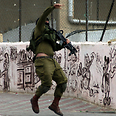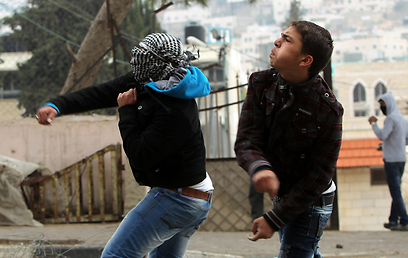
About six months ago, towards the end my army service as a deputy company commander in an infantry brigade, I was pressured by commanders to become a cadet in the company commanders' course and continue my military career. Eventually, after much deliberation, I decided to leave the army, largely due to the fact that it is hard to be a combat soldier in the West Bank - as proven by the video we have all seen on the Internet.
As a resident of the West Bank, I experienced the difficult second intifada era first hand. Shootings on main roads, the infiltration of communities, as well as creative and deadly terror attacks orchestrated by terrorists who lived just a few kilometers from my home. As a child, I was full of admiration for the soldiers who fought so I could live in peace, and they did so with limited support from army helicopters and tanks. I knew that I too would enlist in a combat unit.
On the day of my recruitment I was assigned to an infantry brigade. I completed an intense and challenging program during which I was trained to fight any enemy – be it a foreign army or a few terrorists hiding among the civilian population. Following my training, I was assigned to a unit in the West Bank – full of motivation and with a sense of mission. I manned checkposts and apprehended suicide bombers and Palestinian terror leaders. I felt I was doing important work.
Two years later I returned to the West Bank, this time as a platoon commander. Since my first tour of duty there, in 2008, the rules of engagement became much stricter.
If in 2008 a man holding a Molotov cocktail beside a road was considered a threat to people's lives, two years later – following too many incidents involving trigger-happy soldiers – the rules changed. Now it was permitted to shoot the man in the legs, but only if the firebomb was lighted and the terrorist was about to throw it at a car.
Only a super-fighter is capable of making such distinctions while running up a mountain with heavy equipment and trying to hit a small target from 50 meters away. We were instructed not to use live fire against stone-throwers. The platoon accepted these orders, but the frustration began to surface during a routine Saturday demonstration.
Soldiers chased away by Palestinian mob
Every Saturday large army forces would prepare to face 15 Palestinian protesters who would try to make their way from a nearby village to a Jewish community. The orders were simple: Block the protesters' path, but refrain from creating situations that would help the Palestinian propaganda in the press. An absurd situation was created whereby once I week I would be standing with my soldiers opposite 15 demonstrators who threw stones at us, and we could not chase after them.
We could not employ crowd-dispersal means such as rubber bullets or gas grenades against them because that would fan the flames. We just stood there, watching them throw rocks at us, until they got bored and went home. After these demonstrations the soldiers would express their frustration, telling me: "Is this what we joined a combat unit for? We are fighters. Our goal is to fight, shoot, conquer – not to just stand around and do nothing while the Arabs pelt us with stones."

Palestinians throw stones at soldiers (Photo: EPA)
As an officer serving in the territories I had the authority to detain any person who threatens the civilians' security while using reasonable physical force. But in actuality, arresting a suspect and using crowd-dispersal means required the authorization of a senior commander. This authorization was not always given.
On the other hand, Border Guard officers were allowed to use crowd-dispersal means and had the authority to arrest anyone. Absurdly, the demonstrators who would throw stones at us ran away as soon as a Border Guard jeep arrived. They knew all we would do was wait until they left, but they feared the Border Guard officers, who used physical force (if needed) to arrest the protesters and sent them to a nearby holding facility for a few hours.
Today, combat soldiers serving in the territories lack the training to deal with protests and civilian population, but they do their best. Even the most problematic and least disciplined soldiers act with restraint and composure in order to end these incidents with the least amount of damage to our forces and to the protesters, as well as to Israel's image. Each week dozens of demonstrations and riots are held throughout the West Bank. Once in a while, when a soldier errs, the press will cover the incident extensively.
Let's take Lt. Col. Shalom Eisner for example. My older brother, who knows him well from the army, speaks of a heralded officer who risked his life countless times to complete a mission and protect his brothers in arms. Eisner found himself facing dozens of protesters who were blocking a road in Israel, but even as a regional commander he had no authority to do anything about it. Not even handcuff them.
Eisner should not have struck the Danish activist with a rifle, but I totally understand his sense of helplessness. After footage of the incident was posted online, all of Eisner's contribution to the country was erased, and the much-admired officer, who had a bright future ahead of him, became "the soldier who struck the Danish activist with a rifle."
Despite everything, you won't hear any complaints from the soldiers in my platoon. They understand the complexity and know that they are not serving to show off, but to complete the missions - even with the very limited sources they are given.
I can also tell you that I will continue serving in the IDF reserves and encourage people to join combat units and contribute to the security of our country, but I really hope I won’t make a mistake during operational activity.
The rules of engagement are becoming more and more restraining, and the sense is that the support from the senior IDF commanders, the press and the people is decreasing.
In my opinion, the solution to this absurd situation is to give soldiers in the West Bank more authority and to boost the presence of Border Guard officers in the area. This way, the soldiers won't feel as helpless and will be able to act without hesitation.
The writer served as a commander in an IDF infantry brigade for four and a half years, including one and a half years in the West Bank.















